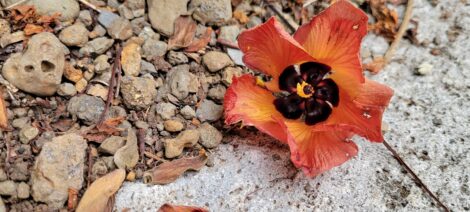67-year-old Wailuku building demolished
The demolition permit for the old Sevilla store and travel agency building on Mill Street in Wailuku should have been reviewed by the State Historic Preservation Division before being granted, a Planning Department official said Friday.
The 67-year-old, two-story building was demolished about two weeks ago, said Chris Hayes of C. Hayes Excavation, the contractor hired by the landowner, Ideal Acres L.P. He said Saturday that the building had to be shored up and braced to prevent debris from falling onto Mill Street and neighboring properties during the demolition. It took a day to bring down the wooden structure with the cleanup of debris expected to be completed by this week.
Hayes applied for the demolition permit in late September and the county granted it Nov. 6, according to county records.
The demolition permit process apparently should have been more rigorous, which would have taken more time to complete. Normally, demolitions or renovations of structures 50 years or older require a review by the State Historic Preservation Division before the permit can be approved.
Usually, the division cannot stop a demolition, like the Sevilla store, but it can require mitigation efforts, such as photographic documentation and architectural drawings to offer the possibility of rebuilding the structure, said Deputy Planning Director Michele Chouteau McLean.
However, there is an exemption to this requirement, which was passed by the Legislature and signed into law by Gov. David Ige in July. The exemption, Act 224, which was opposed by the Planning Department, allows privately owned, single-family homes or townhouses to bypass the State Historic Preservation Division review as long as the structure is not on a historic places registry and is not in a historic district.
The exemption was aimed at the growing number of homes built before the mid-1960s. Much of Dream City in Kahului, for example, went up in the 1950s and ’60s. Renovations and demolition/reconstruction of those cinder-block homes would have required a State Historic Preservation Division review. The bill says that the division’s review could set back construction projects for “many months.”
Because the Sevilla store structure was in “a sort of gray area,” the county granted an Act 224 exemption, McLean said. It was understandable that the exemption from the historic review was applied, she said.
The 7,556-square-foot lot is zoned residential and the building, which had 4,359 square feet, had various uses – as a store, a living area for storekeepers, rental apartments, a bed-and-breakfast and a travel agency. It is not in a historic district and not listed as a historic structure.
However, in re-examining the permit, McLean said that: “In fact, it should have been reviewed by the state.” The use of the building was not strictly as a single-family dwelling, as Act 224 prescribes.
“It is a shame it was demolished,” she said.
McLean said that the demolition company obtained the proper permits, so “the county is not going to fault the owner, because we signed off on the demolition permit.”
Hayes said that the building had a lot of termite damage and was unusable. It would have cost a lot more to fix up than to tear down and rebuild.
Attempts to contact officials with the owner, Ideal Acres L.P., which has a Santa Barbara, Calif., address, to ask about the future of the site, were unsuccessful. Benjamin Bollag is listed as the manager of Ideal Acres in state business records.
The building has a colorful history, built just down the street from the old Wailuku Sugar Mill.
Lolita Eugenio, the daughter of storekeepers Asisclo B. (A.B.) and Frances Sevilla, recalled chasing after sugar cane trains that ran behind the property and traveled between Kahului Harbor and the mill. Children would call to the engineers and ask them to blow their whistle; they often obliged, she recalled.
The Sevilla family owned the site for more than three decades, between 1966 and 2000. Eugenio recalled that the site previously belonged to a Chinese family, which ran a store on the first level and lived on the second floor.
There were other structures on the property then, cottages and a six-room apartment building, she said. Retired Chinese and Filipino laborers with no families on the island lived in the apartments.
“We became their families and caretakers,” Eugenio said. “They were old and had nobody to take care of them.”
As they died or returned to their homelands, the Sevillas used the rooms to help people who were homeless. Churches would call to inquire about finding housing for people, she recalled.
The Sevillas would provide housing, help in filling out job and government assistance forms and baby-sitting services and try to help get them back on their feet.
“In his day, he was way ahead in his thinking,” said son Duke Sevilla, one of six children, said of his father. “He took in homeless people. He took them all in. . . . (Those who) nobody else would take. That is the kind of person my dad was.”
A.B. Sevilla was a leader of the community, an immigrant who left his farming village in Currimao, Ilocos Norte, the Philippines, in 1928 for Hawaii at age 19, according to an oral history with Warren Nishimoto in 1979 as part of the University of Hawaii at Manoa Ethnic Studies Program.
While working in Puunene Mill’s engine room for a dollar a day, Sevilla became a clothing salesman for the Great Western Tailoring Co. He and his two partners would go house to house, camp to camp with samples of tailored suits in their briefcases. A suit cost $21.50, and they made $5 off each sale.
His next business venture involved selling bagoong, a popular Filipino fermented fish product. His son said that his dad was the first salesman of bagoong on Maui. He would order a 25-gallon can of bagoong a month, pick it up at the wharf, put them in gallon and quart bottles and sell them throughout the Puunene plantation camps. He made between $25 and $30 a month from this venture, according to the Nishimoto interview.
A.B. Sevilla worked in the wholesale department of Kahului Store, a plantation store, before opening his own general merchandise store in 1938, selling groceries and furniture. He later delivered kerosene for heaters and stoves to plantation homes.
In 1946, he began hosting a Filipino-language radio show on KMVI, according to a County Council proclamation honoring him in 1982. He served on many business, church and civic organizations.
A.B. Sevilla bought the Mill Street property in 1966, when Eugenio was almost a teenager. The family ran the general store that catered to all ethnic groups. In addition to the usual fare of groceries, Sevilla store also sold fish, including bacalao, a Portuguese favorite; freshwater snails that grew in Keanae taro fields; and tilapia from fishponds they tended. The store also carried Gregulho-baked Portuguese bread.
The Sevillas delivered goods; sold goods on credit, collecting at the end of the month; and required permission from parents before selling candy or soda to the children in the neighborhood. Eugenio also recalled traveling around town delivering kerosene with her dad.
Later, the Sevillas would open Sevilla’s World Tour and Travel. Mrs. Sevilla would handle the paperwork, especially for travelers seeking help with immigration matters. The Sevillas also assisted Filipino laborers returning to their homeland, using round-trip travel commitments the contract workers signed with the contract labor company when they came to Hawaii.
The cottages were torn down for a parking lot in the 1980s, Eugenio said, and a bed-and-breakfast was opened, Maui Dream Inn.
A.B. Sevilla died in 1995, and his wife continued to manage the apartments. Eugenio said that her mom continued to help Mauians of all ethnic groups with immigration paperwork. She would work until everyone was served, sometimes until 10 p.m.
Around 2000, Frances Sevilla decided it was “nuf already,” Eugenio recalled. The property was put on the market and sold for $150,000, according to county property tax records. Nine years later, the old Sevilla store property was sold again to the current owners for $425,000.
About 15 years have passed since the Sevillas owned the property and ran their businesses on the Mill Street site. It was a different time on Maui. “It was very, very local, so plantation days,” Eugenio said.
She has a lot of memories of those days in the family businesses.
The Sevillas aren’t the only ones with memories of the place. Grandchildren of the original Chinese family came to the store one day, asking to walk around.
A woman whose family was helped by the Sevillas wanted to show her daughter where she had lived as a child. The room was more posh than when the woman lived there; it had been renovated for the bed-and-breakfast.
“She winked at me and told her daughter, ‘This is where I lived,’ ” Eugenio said. “It was so cool. She was proud of where she was brought up.”
While she understands the reasons for tearing down the building and the cost of upkeep, Eugenio lamented the loss. She noted that the building was not registered as a historic place, but added, “If people knew the history of it, it would be a different story.”
She has passed the site but has not stopped. She said she would like to walk around the old store grounds.
“I really need to,” Eugenio said. “It’s just too bad.”
“I guess I know, understand,” she said. “We come to an end at a certain point.”
* Lee Imada can be reached at leeimada@mauinews.com.




